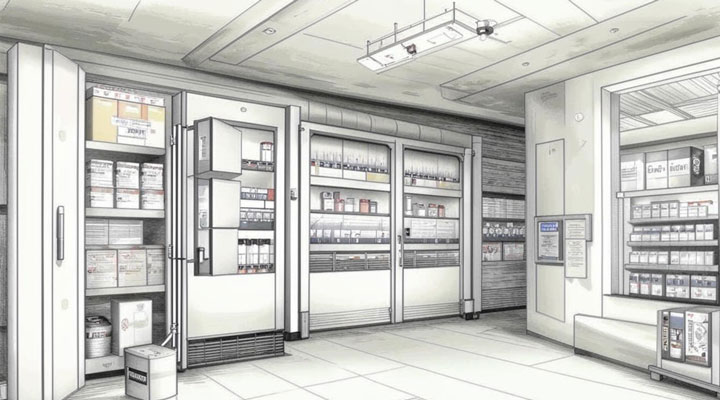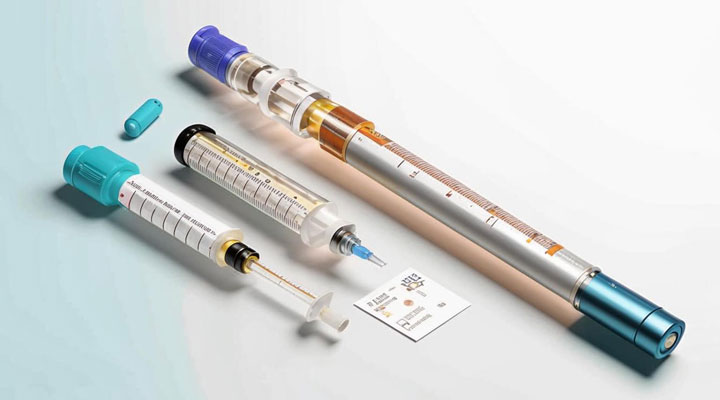Buy GLP-1 Agonists: Complete Guide

Buy GLP-1 for Diabetes and Weight Loss in South Africa
GLP-1, or glucagon-like peptide-1, is a hormone that plays a pivotal role in the regulation of blood sugar levels. It enhances the secretion of insulin when glucose levels are high, suppresses glucagon secretion when not needed, and slows gastric emptying to aid in satiety. These functions make GLP-1 agonists an essential tool in managing type 2 diabetes and, increasingly, in weight management strategies. How to Buy GLP-1 for Diabetes and Weight Loss in South Africa.
Table of Contents
Importance of GLP-1 agonists in the South African healthcare landscape
In South Africa, where diabetes prevalence is rising and obesity is a growing health concern, GLP-1 agonists have become crucial. They not only help in controlling blood glucose levels but also contribute to weight loss, which can significantly reduce the risk of diabetes complications. The importance of these medications in the South African healthcare landscape cannot be overstated, as they offer a dual benefit critical to improving long-term health outcomes in a population grappling with high rates of metabolic syndromes. As such, access to and information about GLP-1 agonists are of paramount importance for both healthcare providers and patients aiming to manage these conditions effectively.
Understanding GLP-1 Agonists
GLP-1 agonists are a class of drugs that mimic the action of the natural hormone glucagon-like peptide-1 (GLP-1), which is involved in the metabolic regulation of glucose. By activating GLP-1 receptors, these agonists enhance the body’s insulin release in response to high blood sugar levels, while simultaneously reducing glucagon secretion when glucose levels are normal. They also slow the emptying of the stomach, which helps decrease appetite and can lead to weight loss. These effects make GLP-1 agonists particularly effective for patients with type 2 diabetes, contributing to better glucose control and providing significant cardiovascular benefits.
Discussion of the most popular GLP-1 agonists available in South Africa
In South Africa, several GLP-1 agonists have gained popularity due to their efficacy and benefits in diabetes management and weight control. Among the most commonly prescribed are:
- Liraglutide (Victoza, Saxenda): Often used not only to manage blood sugar levels but also approved for weight management in individuals who may or may not have diabetes.
- Dulaglutide (Trulicity): Known for its once-weekly injection, it is favored for its convenience and effectiveness in improving glycemic control.
- Semaglutide (Ozempic, Rybelsus): Available both as an injectable (Ozempic) and an oral form (Rybelsus), it provides flexibility in administration and has shown significant results in lowering blood sugar and body weight.
These medications have become integral in the treatment regimes of many South African patients, offering not just a means to control diabetes but also a way to potentially reverse some of its adverse effects through weight loss. As these treatments become more widespread, their impact on the health outcomes of South Africans continues to grow, marking them as essential components in the fight against diabetes and obesity.
Key Considerations for Buying GLP-1 in South Africa
| Consideration | Description | Tips or Additional Info |
|---|---|---|
| Prescription Required | Yes, a prescription from a licensed healthcare provider is required. | Consult with your doctor for a prescription. |
| Popular Brands | Saxenda, Trulicity, Ozempic, Rybelsus | Discuss with your doctor which brand is suitable for you. |
| Where to Purchase | Licensed pharmacies, certified online pharmacies | Verify the pharmacy’s credentials before purchase. |
| Average Cost | Varies widely depending on the brand and dosage | Shop around or ask about generic options to save costs. |
| Insurance Coverage | Often covered under health insurance plans | Check your policy details for coverage specifics. |
| Import Regulations | Import permits required for non-available brands | Apply through SAHPRA for necessary permits. |
Legal and Medical Requirements for Buying GLP-1 in South Africa
Prescription Requirements for GLP-1 Agonists
In South Africa, GLP-1 agonists are classified as prescription medications, which means they can only be obtained with a valid prescription from a licensed healthcare provider. This requirement ensures that patients undergo proper medical evaluation and receive guidance on the appropriate use of these drugs. Healthcare providers assess various factors such as the patient’s medical history, current health condition, and specific treatment needs before prescribing GLP-1 agonists. This careful oversight is crucial because, while highly effective, these medications can have significant interactions and side effects that need to be managed under professional supervision.
Legal Framework Regulating GLP-1 Sales
The sale and distribution of GLP-1 agonists in South Africa are regulated by the South African Health Products Regulatory Authority (SAHPRA). SAHPRA oversees the approval, marketing, and post-market surveillance of all health products to ensure they meet stringent safety, efficacy, and quality standards. Under this framework, pharmaceutical companies must obtain approval before their GLP-1 agonists can be sold in the country. Additionally, pharmacies and healthcare facilities that dispense these medications must comply with storage, handling, and record-keeping regulations to maintain their efficacy and ensure patient safety.
The regulatory landscape in South Africa aims to protect patients and ensure that treatments for chronic conditions such as diabetes and obesity are used appropriately and safely. By adhering to these regulations, the healthcare system works to optimize the therapeutic benefits of GLP-1 agonists while minimizing potential risks to patients.
Where to Buy GLP-1 in South Africa
Reputable Pharmacies and Medical Facilities
GLP-1 agonists can be purchased from a variety of reputable pharmacies and medical facilities across South Africa. Some well-known pharmacy chains that stock GLP-1 agonists include Dis-Chem, Clicks, and independent community pharmacies that are licensed to dispense prescription medications.
https://ozempicsouthafrica.com/buy-glp-1-south-africa/
Additionally, many hospitals and diabetes clinics also provide access to these medications, ensuring that patients receive them in conjunction with comprehensive diabetes care and counseling. It’s essential for patients to ensure that they visit pharmacies and facilities that are registered with the South African Pharmacy Council to guarantee the authenticity and proper handling of the medication.
Online vs. In-store Purchasing Options
While in-store purchases remain common, online pharmacies offer an alternative that can be particularly convenient for patients living in remote areas or those with mobility issues. Online pharmacy services like Pharmacy Direct and Netpharmacy provide an avenue for patients to order their GLP-1 agonists online. These platforms require a valid prescription, which can typically be uploaded via their website or sent through email. After verification, the medication is delivered directly to the patient’s home.
However, when purchasing GLP-1 agonists online, it is crucial to use only reputable services that guarantee the storage and shipment conditions necessary to maintain the medication’s efficacy. Patients should also be wary of online retailers not affiliated with known pharmacies or healthcare providers, as these may sell counterfeit or expired products.
Choosing between online and in-store purchasing options often depends on personal convenience, access to transportation, and comfort with online transactions. In all cases, the most important factor is to ensure that the source is reputable and that the supply chain is secure to safeguard one’s health.
Cost of GLP-1 in South Africa
Average Cost of GLP-1 Agonists
The cost of GLP-1 agonists in South Africa can vary widely depending on the specific medication and dosage required. On average, patients might expect to pay anywhere from several hundred to over a thousand South African Rand per month for treatment. Factors such as brand (generic vs. name-brand), dosage, and the pharmaceutical company’s pricing strategy significantly influence the final retail price. Additionally, the cost may fluctuate based on supply chain factors and import costs, as many of these medications are produced internationally.

Factors Affecting Pricing
Several factors contribute to buy GLP-1 agonists in South Africa:
- Regulatory Approvals: The cost of getting regulatory approval and maintaining compliance with local laws can influence drug prices.
- Importation Costs: Since many GLP-1 agonists are imported, currency exchange rates and transportation costs add to the overall price.
- Healthcare Provider Agreements: Negotiations and contracts between healthcare providers and pharmaceutical companies can affect how much patients pay for these medications.
- Market Demand: Higher demand for GLP-1 agonists can sometimes drive up prices, particularly if supply is limited.
Tips for Finding Affordable Options
- Generic Alternatives: Ask your healthcare provider if there are generic versions of the prescribed buy GLP-1 agonist, which are typically less expensive but just as effective.
- Insurance Coverage: Many health insurance plans cover prescription medications, including GLP-1 agonists. Check with your insurer to understand the extent of coverage and any copayments required.
- Patient Assistance Programs: Some pharmaceutical companies offer patient assistance programs that provide medications at a reduced cost or even for free to eligible patients.
- Comparison Shopping: Compare prices at different pharmacies. Online platforms can be especially useful for this, allowing quick comparison of prices across multiple outlets.
- Bulk Buying: Some pharmacies offer discounts for purchasing a several-month supply at once, which might be beneficial for long-term users.
Importing GLP-1 into South Africa
Guidelines on Importing GLP-1 Agonists
If specific GLP-1 agonists are not available locally in South Africa, patients and healthcare providers may consider importing them. The process involves several critical steps to ensure compliance with local regulations:
- Obtain a Prescription: A valid prescription from a licensed medical professional is mandatory. This prescription must clearly specify the need for the buy GLP-1 agonist not available in the country.
- Permits and Approval: Before importing any medication, it’s necessary to obtain an import permit from the South African Health Products Regulatory Authority (SAHPRA). This permit is contingent upon the submission of relevant documentation, including the prescription, a motivation letter from the doctor, and details about the drug from the manufacturer.
- Choose a Reputable Supplier: It’s crucial to source the medication from a reputable pharmacy or supplier abroad to ensure the quality and authenticity of the medication.
- Customs Clearance: Medications entering South Africa are subject to customs clearance. Importers must declare the medication at customs and present all necessary documentation, including the SAHPRA import permit and proof of prescription.
Legal Considerations and Customs Regulations
Legal compliance is paramount when importing GLP-1 agonists into South Africa. Here are key considerations:
- Regulatory Compliance: All imported GLP-1 agonists must meet the SAHPRA’s standards for safety and efficacy. SAHPRA periodically updates its list of approved medications and suppliers, which must be consulted during the import process.
- Customs Duties and Taxes: Depending on the value and quantity of the imported medication, customs duties and taxes may apply. These costs need to be factored into the overall expense of obtaining the medication.
- Documentation and Labelling: The medication must be properly labeled according to SAHPRA guidelines, including details about the medication’s contents, dosage, and the manufacturer’s information.
- Legal Liabilities: Importing pharmaceuticals carries legal liabilities, especially if the imported drugs do not comply with South African standards. This can lead to penalties, confiscation of the medication, and even criminal charges.
Patient Experiences and Recommendations
Testimonials from South African Users of buy GLP-1 Agonists
Many South Africans who have used GLP-1 agonists share positive experiences, particularly in terms of managing diabetes and aiding in weight loss. For instance, a user from Johannesburg reported significant improvements in blood sugar levels and a noticeable reduction in appetite, which helped in losing weight that was otherwise hard to shed. Another patient from Cape Town highlighted the convenience of the dosing regimen, which improved adherence and overall management of her type 2 diabetes.
However, it’s important to note that experiences can vary. Some users have reported mild to moderate side effects, such as nausea and digestive discomfort, especially in the initial stages of treatment. These accounts are valuable for new patients to set realistic expectations and prepare for potential side effects.
Recommendations from Healthcare Professionals on Effective Use
Healthcare professionals play a crucial role in ensuring that patients receive the maximum benefit from using GLP-1 agonists. Here are some of their top recommendations for effective use:
- Consistent Monitoring: Regular monitoring of blood glucose levels is essential to assess the effectiveness of the treatment and make any necessary adjustments.
- Lifestyle Modifications: While GLP-1 agonists can significantly improve glucose control and promote weight loss, combining these medications with lifestyle changes such as a balanced diet and regular physical activity can enhance the benefits.
- Adherence to Prescribed Regimen: Healthcare providers emphasize the importance of adhering strictly to the prescribed dosing schedule to maintain steady therapeutic levels of the medication in the body.
- Managing Side Effects: Patients are advised to report any side effects to their healthcare provider. Some side effects may diminish over time, but others might require adjustments to the dosage or even a switch to a different medication.
- Education on Injection Technique: Proper training on how to administer injectable GLP-1 agonists is crucial. Incorrect injection techniques can lead to complications such as infections or improper dosing.
- Regular Consultations: Ongoing consultations with healthcare providers are recommended to track progress, discuss concerns, and adjust treatment plans as needed.
Conclusion
GLP-1 agonists have emerged as a significant tool in managing type 2 diabetes and aiding weight loss, offering substantial benefits for patients in South Africa. These medications work by enhancing insulin secretion, suppressing glucagon release, and delaying gastric emptying, which collectively help improve blood glucose control and reduce appetite. However, obtaining and using GLP-1 agonists involves navigating a series of important considerations. For more info search in our news blog.
.Recap of the key points on buy GLP-1 in South Africa
- Prescription Requirement: GLP-1 agonists are available only with a prescription, underscoring the need for professional healthcare consultation.
- Regulatory Oversight: The South African Health Products Regulatory Authority (SAHPRA) regulates the approval and sale of these medications, ensuring they meet safety and efficacy standards.
- Purchasing Channels: Patients can acquire GLP-1 agonists through reputable pharmacies and medical facilities, with the option to buy in-store or online. Ensuring the source is reliable is crucial to avoid counterfeit products.
- Cost Considerations: While the cost of GLP-1 agonists can be high, exploring insurance coverage, patient assistance programs, and generic alternatives can make these treatments more accessible.
- Importation Guidelines: If necessary, importing GLP-1 agonists requires adherence to strict legal and regulatory guidelines, including obtaining the appropriate permits and ensuring compliance with SAHPRA standards.
Encouragement for consultation with healthcare providers before starting treatment
Given the complexities associated with these medications, including potential side effects and the need for precise dosing, consultation with healthcare providers is essential. Medical professionals can provide valuable guidance on the suitability of GLP-1 agonists based on individual health conditions, assist in managing side effects, and contribute to optimizing treatment outcomes. Therefore, anyone considering GLP-1 agonists for diabetes management or weight loss should first discuss this option with their healthcare provider to ensure it aligns with their overall health strategy and to establish a tailored and effective treatment plan.
Frequently Asked Questions (FAQ) About Buy GLP-1 Agonists in South Africa
What are GLP-1 agonists?
GLP-1 agonists are a class of medications that mimic the action of the natural hormone glucagon-like peptide-1, which helps regulate blood sugar levels. They are primarily used to treat type 2 diabetes and assist in weight loss by enhancing insulin secretion, reducing glucagon release, and slowing gastric emptying.
Who can prescribe GLP-1 agonists in South Africa?
Only licensed healthcare providers, such as doctors and endocrinologists, can prescribe GLP-1 agonists in South Africa. A valid prescription is required to purchase these medications.
Where can I buy GLP-1 agonists in South Africa?
GLP-1 agonists can be purchased at reputable pharmacies, both in-store and online, as well as at medical facilities like hospitals and diabetes clinics. It is important to ensure that the pharmacy is registered with the South African Pharmacy Council.
Are GLP-1 agonists covered by health insurance in South Africa?
Many health insurance plans do cover GLP-1 agonists under their prescription medication benefits. However, coverage details and out-of-pocket costs can vary, so it’s advisable to check with your insurance provider for specific information.
Can GLP-1 agonists be imported into South Africa?
Yes, GLP-1 agonists can be imported with the necessary permits from the South African Health Products Regulatory Authority (SAHPRA) and a valid prescription. Importing medications also requires adherence to customs regulations and ensuring that the drugs meet local safety standards.
What are the common side effects of GLP-1 agonists?
Common side effects include nausea, vomiting, diarrhea, and abdominal pain. These are usually mild and often diminish over time as the body adjusts to the medication.





